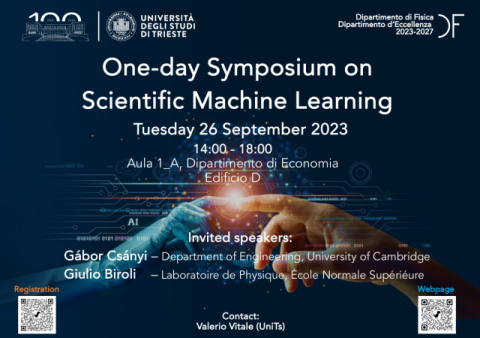- Home
- Dipartimento
- Ricerca
- Didattica
- Post Lauream
- Trasferimento della conoscenza
- Come fare per
"One-day symposium on scientific machine learning" - September 26, 2023
Tipologia evento:
home
Seminari

We are pleased to announce the "One-day Symposium on Scientific Machine Learning", which will be held on the afternoon of September 26, 2023 on the main campus of the University of Trieste (Edificio D, Aula 1_A).
The symposium will focus on cutting edge applications of machine learning techniques in physics, but also in other scientific fields such as chemistry and biology. It will feature two seminars by internationally renowned speakers and contributed talks by young and early career researchers from Trieste research institutions. If you plan to attend, please register here.
Invited speakers:
- Gábor Csányi (University of Cambridge)
- Giulio Biroli (École Normale Supérieure, Paris)
Program
14:00-14:50: “The end of ab initio Molecular Dynamics”, Gábor Csányi
14:50-15:40: “Renormalisation group and machine learning: the Wavelet-Conditional RG”, Giulio Biroli
15:40-16:00: Coffee break
16:00-18:00: Contributed talks (15 minutes + 2 minutes for questions)
- "Data-driven identification of molecular environments in self-assembled monolayers: a proof-of-concept study", Paola Posocco (DIA, UniTS)
- "Integrative methods for Molecular Dynamics simulations: boosting Ensemble Refinement with transferable force-field corrections", Ivan Gilardoni (SISSA)
- "Data-Driven Approaches For Ion Solvation", Giulia Sormani (ICTP)
- "The geometry of hidden representations of large transformer models", Diego Doimo (Area Science Park)
- "Transformer Variational Wave Functions for Frustrated Quantum Spin Systems", Luciano Loris Viteritti (DF, UniTS)
- "Optimal inference of a generalised Potts model by single-layer transformers with factored attention", Riccardo Rende (SISSA)
- "Olfactory search with finite-state controllers", Kyrell Vann Verano (DF, UniTS)
Abstracts (invited talks)
“The end of ab initio Molecular Dynamics”, Gábor Csányi
A new computational task has been defined and solved over the past 15 years for extended material systems: the analytic fitting of the Born-Oppenheimer potential energy surface as a function of nuclear coordinates under the assumption of medium-range interactions, 5 ~ 10 Å. The resulting potentials are reactive, many-body, reach accuracies of a few meV/atom, with evaluation costs that are on the order of 0.1-10 ms/atom/cpucore. Applications to diverse material systems are being published every week, and the extension to molecular force fields is well underway. Important challenges remain: treatment of long range interactions in the form of charge self-consistency, magnetism etc. On the methodological side, with deeper understanding of the geometry problem of describing environments comes what appears to be a convergence between various modeling approaches (neural networks, kernels, polynomials). Protocols of putting together the training data are being explored, including "active learning";. I am particularly interested in the amount physics and chemistry "knowledge"; that we can impute into these approximations, and that they can be used to help "extrapolate" correctly into regions of configuration space far from those in the data set.
“Renormalisation group and machine learning: the Wavelet-Conditional RG”, Giulio Biroli
Reconstructing, or generating, high dimensional distributions starting from data is a central problem in machine learning and data sciences. I will present a method —The Wavelet Conditional Renormalization Group —that combines ideas from physics (renormalization group theory) and computer science (wavelets, stable representations of operators). The Wavelet Conditional Renormalization Group allows to reconstruct in a very efficient way classes of high dimensional distributions hierarchically from large to small spatial scales. I will present the method and then show its applications to data from statistical physics and cosmology. The Wavelet Conditional Renormalization Group Method also provides interesting insights on the interplay between structures of data and architectures of deep neural networks.
Luogo:
Edificio D, Aula 1_A
Promotore:
Valerio Vitale (DF, UniTS), Daniele Coslovich (DF, UniTS) and Alex Rodriguez (DMG, UniTS)
Contatti:
Valerio Vitale (UniTS)
Ultimo aggiornamento: 19-09-2023 - 12:55



